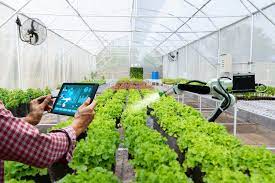
The Future of Agriculture Technology
As the world’s population continues to grow, the demand for food production is increasing at an unprecedented rate. Agriculture technology, often referred to as AgriTech, is playing a crucial role in revolutionising the way we cultivate crops and raise livestock. From precision farming to automated machinery, here’s a glimpse into the future of agriculture technology.
Precision Farming
Precision farming involves using advanced technologies such as GPS, sensors, drones and data analytics to optimise agricultural practices. By collecting real-time data on soil conditions, weather patterns and crop health, farmers can make informed decisions to enhance productivity and reduce waste. This targeted approach not only improves crop yields but also minimises environmental impact by reducing the use of water, fertilisers and pesticides.
Automated Machinery
Gone are the days of manual labour in agriculture. Automated machinery such as robotic harvesters, self-driving tractors and drones are transforming the way tasks are performed on farms. These machines can operate with precision and efficiency, saving time and labour costs for farmers. With advancements in artificial intelligence and machine learning, these technologies are becoming smarter and more autonomous, paving the way for a new era of mechanised agriculture.
Vertical Farming
Vertical farming is a sustainable agricultural practice that involves growing crops in vertically stacked layers or structures indoors. By utilising controlled environments with artificial lighting and climate control systems, vertical farms can produce high yields of crops year-round without relying on traditional farmland. This innovative approach not only conserves space but also reduces water usage and eliminates the need for pesticides.
The Internet of Things (IoT)
The Internet of Things (IoT) is connecting devices and sensors across agricultural operations to enable real-time monitoring and management. IoT technology allows farmers to remotely track soil moisture levels, monitor livestock health and control irrigation systems from their smartphones or computers. By harnessing IoT solutions, farmers can improve efficiency, reduce costs and maximise yields through data-driven insights.
Conclusion
Agriculture technology is reshaping the future of farming by introducing innovative solutions that enhance productivity, sustainability and profitability. With ongoing advancements in AgriTech, farmers have access to tools and techniques that empower them to meet the challenges of feeding a growing population while preserving natural resources. Embracing these technologies will be key to ensuring food security for generations to come.
Top 5 Tips for Enhancing Agricultural Efficiency with Advanced Technology
- Utilize precision farming techniques to optimize crop production and reduce waste.
- Incorporate IoT devices and sensors to monitor soil conditions, weather patterns, and crop health in real-time.
- Implement automated irrigation systems to efficiently water crops based on their specific needs.
- Use drones for aerial surveillance to identify areas of pest infestation or disease outbreak early on.
- Explore the use of AI algorithms for data analysis to make informed decisions regarding planting, harvesting, and pest control.
Utilize precision farming techniques to optimize crop production and reduce waste.
By utilising precision farming techniques, farmers can revolutionise their crop production processes and significantly minimise waste. Through the use of advanced technologies such as GPS, sensors, and data analytics, they can gather real-time information on soil conditions, weather patterns, and crop health. This data-driven approach enables farmers to make informed decisions that enhance productivity while reducing the environmental impact of farming practices. Precision farming not only optimises crop yields but also promotes resource efficiency by minimising the use of water, fertilisers, and pesticides.
Incorporate IoT devices and sensors to monitor soil conditions, weather patterns, and crop health in real-time.
By incorporating IoT devices and sensors into agricultural practices, farmers can gain valuable insights into soil conditions, weather patterns, and crop health in real-time. This technology allows for precise monitoring and data collection, enabling farmers to make informed decisions that optimise crop growth and resource management. By leveraging IoT solutions, farmers can enhance productivity, reduce waste, and improve overall efficiency in their farming operations.
Implement automated irrigation systems to efficiently water crops based on their specific needs.
Implementing automated irrigation systems in agriculture is a game-changer for farmers looking to optimise water usage and enhance crop growth. By tailoring irrigation schedules to meet the specific needs of each crop, these systems ensure that plants receive the right amount of water at the right time. This not only promotes healthier plant development but also conserves water resources by avoiding overwatering or underwatering. Automated irrigation technology brings precision and efficiency to farming practices, ultimately leading to improved yields and sustainable agricultural production.
Use drones for aerial surveillance to identify areas of pest infestation or disease outbreak early on.
Utilising drones for aerial surveillance in agriculture technology is a game-changer when it comes to early detection of pest infestations or disease outbreaks. By deploying drones equipped with high-resolution cameras and sensors, farmers can efficiently monitor their fields from above, enabling them to pinpoint problem areas quickly and accurately. This proactive approach allows farmers to take timely measures to mitigate the spread of pests or diseases, ultimately safeguarding crop yields and ensuring a more sustainable farming practice.
Explore the use of AI algorithms for data analysis to make informed decisions regarding planting, harvesting, and pest control.
Artificial Intelligence (AI) algorithms are revolutionising the agricultural sector by providing farmers with sophisticated tools for data analysis. By leveraging AI, farmers can process vast amounts of information related to soil conditions, weather patterns, and crop health to make informed decisions about planting and harvesting. Additionally, AI can predict pest infestations and suggest optimal pest control measures, thereby reducing crop damage and minimising the use of harmful pesticides. This data-driven approach not only enhances productivity but also promotes sustainable farming practices by ensuring resources are used efficiently and effectively.
